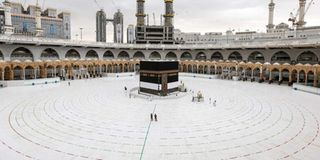Premium
Muslims begin downsized hajj pilgrimage

This picture taken on July 28, 2020 shows a view of the Kaaba, Islam's holiest shrine, at the centre of the Grand Mosque in the holy city of Mecca, ahead of the annual Muslim Hajj pilgrimage. PHOTO | AFP
What you need to know:
- The hajj, one of the five pillars of Islam and a must for able-bodied Muslims at least once in their lifetime, is usually one of the world's largest religious gatherings.
- But this year only up to 10,000 people already residing in the kingdom will participate in the ritual, a tiny fraction of the 2.5 million pilgrims from around the world that attended last year.
- Some 70 percent of the pilgrims are foreigners residing in the kingdom, while the rest will be Saudi citizens, authorities said.
Muslim pilgrims on Wednesday begin the annual hajj, dramatically downsized this year as the Saudi hosts strive to prevent a coronavirus outbreak during the five-day pilgrimage.
The hajj, one of the five pillars of Islam and a must for able-bodied Muslims at least once in their lifetime, is usually one of the world's largest religious gatherings.
But this year only up to 10,000 people already residing in the kingdom will participate in the ritual, a tiny fraction of the 2.5 million pilgrims from around the world that attended last year.
"There are no security-related concerns in this pilgrimage, but (downsizing) is to protect pilgrims from the danger of the pandemic," said Khalid bin Qarar Al-Harbi, Saudi Arabia's director of public security.
Pilgrims will be required to wear masks and observe social distancing during a series of religious rites that are completed over five days in the holy city of Mecca and its surroundings in western Saudi Arabia.
Those selected to take part in the hajj were subject to temperature checks and placed in quarantine as they began trickling into Mecca at the weekend.
State media showed health workers sanitising their luggage, and some pilgrims reported being given electronic wristbands to allow authorities to monitor their whereabouts.

A worker sanitises a pilgrim's luggage in a hotel lobby located near the Grand Mosque in Saudi Arabia's holy city of Mecca.
Workers, clutching brooms and disinfectant, were seen cleaning the area around the Kaaba, the structure at the centre of the Grand Mosque draped in gold-embroidered cloth towards which Muslims around the world pray.
Hajj authorities have cordoned off the Kaaba this year, saying pilgrims will not be allowed to touch it, to limit the chances of infection.
They also reported setting up multiple health facilities, mobile clinics and ambulances to cater to the pilgrims.
The foreign press are barred from this year's hajj, usually a huge global media event, as the government tightens access to Mecca.
Saudi authorities initially said only around 1,000 pilgrims residing in the kingdom would be permitted for the hajj, but local media reports say as many as 10,000 will be allowed to take part.

A member of the hajj staff burns incense while a few pilgrims circumambulate the Kaaba, Islam's holiest shrine, at the Grand Mosque in the holy city of Mecca, on July 26, 2020. PHOTO | AFP
Some 70 percent of the pilgrims are foreigners residing in the kingdom, while the rest will be Saudi citizens, authorities said.
All worshippers were required to be tested for coronavirus before arriving in Mecca and will also have to quarantine after the pilgrimage as the number of cases in the kingdom nears 270,000 -- one of the largest outbreaks in the Middle East.
They were given elaborate amenity kits that include sterilised pebbles for a stoning ritual, disinfectants, masks, a prayer rug and the ihram, a seamless white garment worn by pilgrims, according to a hajj ministry programme document.
"I did not expect, among millions of Muslims, to be blessed with approval," Emirati pilgrim Abdullah al-Kathiri said in a video released by the Saudi media ministry.
"It is an indescribable feeling... especially since it is my first pilgrimage."
The hajj ministry said non-Saudi residents of the kingdom from around 160 countries competed in the online selection process but it did not say how many people applied.

A member of the hajj staff applying Oud perfume to the Kaaba. PHOTO | AFP
Some disappointed applicants have complained that the government-run lottery was not clearly outlined and that no reason was given for their rejection.
The hajj ministry has fielded a deluge of anguished queries on Twitter from rejected applicants.
But Hajj Minister Mohammad Benten insisted the process was transparent, telling the Saudi-owned Al-Arabiya television that "health determinants" formed the basis of selection.
Despite the pandemic, many pilgrims consider it safer to participate in this year's ritual without the usual colossal crowds cramming into tiny religious sites, which make it a logistical nightmare and a health hazard.
Even in a regular year, the hajj leaves pilgrims exposed to a host of illnesses.
The government scaled back the pilgrimage as it could be a major source of contagion, but the move will deepen the kingdom's economic slump, analysts say.

A mask-clad woman stands on a ring delineating where worshippers be around the Kaaba. PHOTO | AFP
Saudi Arabia is already facing a sharp downturn in oil prices due to a collapse in global demand driven by national lockdowns, which triggered austerity measures, including the tripling of a value added tax and cuts to civil servants' allowances.
The virus has also battered pilgrimage-reliant businesses that support hundreds of thousands of jobs in Mecca, from travel agents to street barbers and souvenir shops.
The hajj and the year-round umrah pilgrimages together rake in some $12 billion annually.





